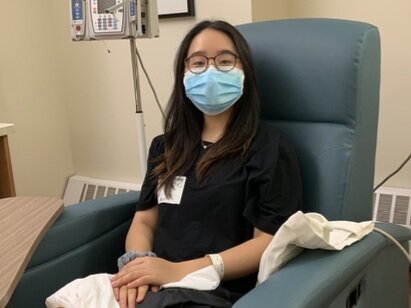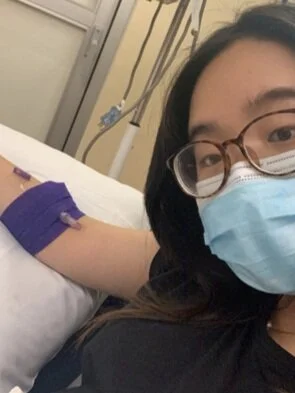5 Things I've Learned Living On My Own
By Laurel Dorr from Maine, USA
I have been away at college for the last couple of months, and although I am living semi-independently in a dorm, it’s the first time I have lived away from my parents.
Below, I talk about 5 reflections and lessons that have come up as I learn to live with inflammatory bowel disease (IBD) in a new environment.
1. What you need is not “too much.”
Fortunately, my college has provided several crucial housing accommodations for me. Yet I have found myself avoiding eye contact when people asked me about my roommate (I have a single room), or hesitating to mention the attached bathroom when someone asks about my room. I kept unconsciously feeling like these were awkward details, or even like I was “bragging” about my living situation.
But these accommodations, along with several others, have made my life so much more manageable. And if anyone has a problem with it, they have never said so to me. Don’t let fear or shame keep you from asking for what you need. I can’t imagine what my life would look like without these supports.
2. It’s okay to be alone.
I have often felt out of place here, for a number of reasons; not least because I am a transfer student, and slightly older than a typical undergraduate. There are also health concerns to consider: for instance, I can’t safely do things many of my peers do, like drink alcohol, go to crowded parties, or even stay out late. (No judgment against those who can!)
For one reason or another, I haven’t forged many deep connections or friendships yet, and frequently find myself studying or eating at the dining hall alone. But, I don’t see it as time wasted.
Instead, I have used this time to get used to being alone, and focusing on self-care. My body is experiencing just as much upheaval in this new environment as my social life is, and taking the time to acclimate and get comfortable with it has been beneficial to my health. I will find the right people eventually—but for now, my attention is where it needs to be.
3. However… part of self care is doing what’s best for you.
Even when it’s uncomfortable. When I talk about being alone, I don’t mean to say that I haven’t tried new things or put myself out there. I know that it is easy for me to self-isolate. Sometimes, it was even necessary, when I was sicker than I am now. But that isn’t always best for me. So while I cherish my alone time, I also try to step out of my social comfort zone.
For example, I usually set aside time for at least 1-2 campus activities (clubs, events) per week. In general, I also avoid eating or studying in my dorm room as much as possible—even if that just means reading in my floor’s common/lounge room, some days. Baby steps!
4. Doing the hard things is just as important as resting.
I know I need time to rest and recharge, but it has taken me awhile to get on a good schedule and routine. College classes are hard enough, but living semi-independently makes it even more challenging. For instance, taking time each week to do things like laundry and cleaning, walking some distance to dining halls and classes across campus, attending office hours and extracurriculars—all of it builds up, and usually takes more time than I anticipate.
What has helped me is cliché, but true: setting up a schedule, and sticking to it. If I put off a difficult homework assignment until the last minute, it ends up taking away from my relaxing time in the evening, which makes the next day that much more exhausting, and I start putting off even more work. It’s a difficult cycle to break, but the way I feel and function when I manage my time well makes it worthwhile.
5. Make your space somewhere you want to spend time.
I have also found it helpful to make my space feel refreshing and comfortable. Although I try not to spend too much time in my room, that’s not always possible. Some days, my IBD symptoms make it harder to leave.
Rather than let my environment add to that stress, though, I make sure to keep my curtains open and my space tidy; I have decorated with nature-inspired themes, like potted plants, artificial vines, and floral bedding; and I made sure to fill the room with cozy items, like a soft area rug and plenty of pillows.
These are just a few examples of how I manage my IBD within college life and living (more or less) on my own. However, it is an ongoing learning process for me. What have you learned about living on your own with IBD?
Featured photo by Ja Kubislav from Pexels.

















